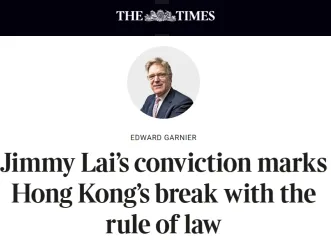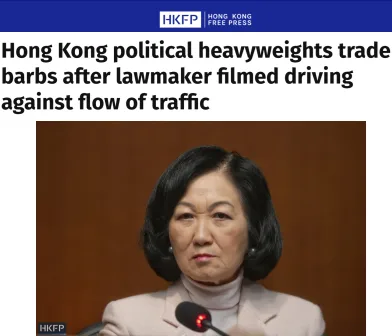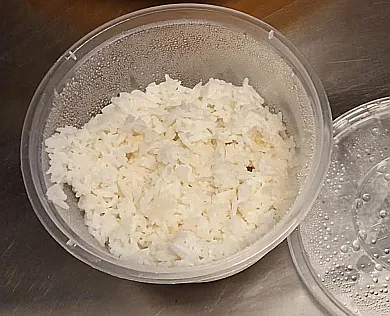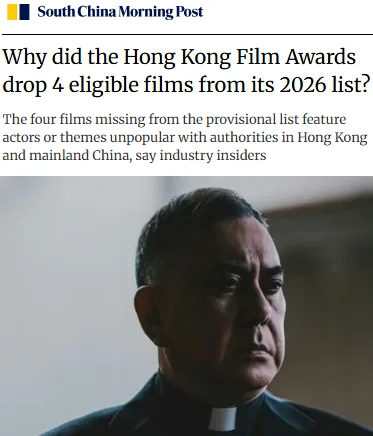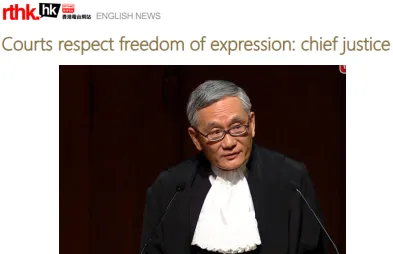A former UK Solicitor-General writes in the (paywalled) London Times on Jimmy Lai…
…on December 15, 2025, Jimmy Lai, a businessman, media owner and democracy campaigner, was convicted of sedition and crimes against national security in Hong Kong. The British citizen’s case symbolises the end of an acceptable version of the rule of law in that once respected jurisdiction.
Wrongly arrested, arbitrarily imprisoned, tried on evidence possibly extracted by torture and then convicted for nothing more than what he thought, said and wrote, Lai has been the victim of a political prosecution leading to a political conviction.
…On almost all of the 855 pages of the judgment convicting Lai there is a reference to his antipathy towards China and the Chinese Communist Party and his support for the peaceful pro-democracy movement. That these opinions are used as the basis of a criminal conviction shows how far towards tyranny Hong Kong has already travelled.
Lingua Sinica reports on RTHK…
These moves [ending of Letter from Hong Kong and others], following years of heavy-handed management that saw programs canceled, or pulled hours before airing, and sensitive episodes scrubbed from schedules and archives, mark RTHK’s continued retreat on the programming side from its role as a public broadcaster — and increasingly, its integration into the orbit of China’s state media.
The latter shift was crystal clear this month as Hong Kong’s director of broadcasting, Angelina Kwan Yuen-yee (關婉儀), who oversees RTHK, led a delegation to Beijing and Tianjin. She met with officials from China Media Group (CMG) and the National Radio and Television Administration (NRTA) — both directly under the Central Propaganda Department … [and] said, [RTHK] must “tell the national story and the Hong Kong story well.”
…Even the memory of RTHK’s fearlessness and independence has become a matter of sensitivity. In 2023, the network quietly removed a 34-year-old letter of gratitude from its newsroom, which had honored journalists for their reporting on the 1989 Tiananmen crackdown. Once willing to confront sensitive truths, RTHK has now fully retreated from its public mission
According to Bloomberg, Blackstone is in talks to become New World’s biggest shareholder, with the Cheng family possibly losing control of the company…
The move also highlights Blackstone’s focus on acquiring value-rich assets in stressed markets and scaling platforms, with the deal handing it control of a large portfolio of malls and office towers.
It’s not like Hong Kong has a shortage of malls and office towers. I guess it depends on what price they’re offering. The company is desperate.
Bearing one or more of the above items in mind – Metaphor of the Week: ‘severely decomposed whale carcass believed to have died [sic] for some time has been found on the shores of Sai Kung’.
From China Unofficial Archives, a plea for accountability for the Wuhan/China Covid cover-up. It’s astonishing that governments, scientists and commentators around the world have barely mentioned Chinese leaders’ role in allowing the disease to spread globally and cause millions of deaths and trillions of dollars worth of economic disruption. Conveniently for Beijing, public attention on the issue has been distracted by irrelevant click-bait ‘lab-leak’ conspiracy theories…
The COVID-19 pandemic eventually spread from China to the entire world. According to public data from the World Health Organization (WHO), by March 19, 2020—nearly two months after the Wuhan lockdown began—the virus had reached over 150 countries and regions, and the number of global cases far exceeded those within China. This rare and massive pandemic profoundly reshaped global economics and politics…
…Looking back, it is evident that the Chinese government provided false information and inaccurate data at the start of the pandemic, which severely misled the WHO and foreign governments. Dr. Gauden Galea, the WHO representative in China at the time, noted that the WHO was entirely dependent on information reported by China—including the critical question of human-to-human transmission—and therefore failed to issue timely warnings. Deborah Birx, a leader of the U.S. coronavirus task force, remarked that the medical community interpreted Chinese data to mean the situation was serious but manageable, not a potential global pandemic.
When Wuhan was locked down on January 23, some argued that the world should have understood the gravity of the situation then. However, this ignores the fact that the Chinese government’s propaganda at the time insisted the lockdown was a massive sacrifice that had contained the virus within China, buying the world time while overseas cases remained under 1%. This narrative continued to mislead the international community. Even on January 24, The Lancet editor Richard Horton stated there was no need to panic, and the WHO advised against travel restrictions. When the U.S. government announced a flight ban in late January, China denounced the move as “unkind.” The world was effectively blinded by a combination of flawed data and state propaganda.
China itself was one of the biggest victims of official secretiveness at the beginning of the outbreak.
…Extrapolating from … leaked figures, the number of excess deaths in China during the biggest wave from late 2022 to early 2023 was at least 4 million, and perhaps as high as 5.95 million. When combined with deaths from the preceding three years, the total represents a staggering loss of life that likely ranks among the highest in the world.
A longish ‘alternative view of China’s declining birth rate’ by a Chinese single mother in Canada.
New Republic on the Slovenian hooker movie…
The documentary detailing the first lady’s return to the White House is projected to make just $1 million in its first week. While documentaries generally do worse at the box office, the sheer amount of money Amazon spent—$40 million for the rights, $35 million for an aggressive marketing blitz—and the constant stream of Truth Social posts from President Trump make this a particularly pitiful showing.
Melania’s early failure comes as a new report from Rolling Stone details serious labor issues behind the scenes and a whopping two-thirds of the film’s staff requesting not to be credited at the end of the film. Director Brett Ratner, who made headlines after six women accused him of sexual assault and harassment during the #MeToo movement in 2017, was perhaps the most loathed person on set.

